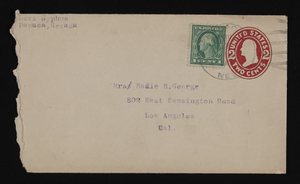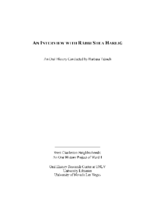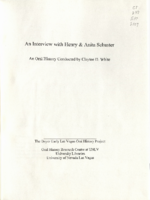Search the Special Collections and Archives Portal
Search Results

Correspondence, Levi Syphus to Sadie George
Date
Archival Collection
Description
Text

John Robinson Pacheco interview, June 24, 2019: transcript
Date
Archival Collection
Description
Interviewed by Laurents Bañuelos-Benitez. John Pacheco's father, Francisco, arrived in Las Vegas in 1942. John was born in 1947 and raised mostly on 27th Street. He is a graduate of Rancho High School and UNLV. He is a retired artist known for hand-painting signage for many local businesses. As a very civic minded person, John has received many local awards and served on committees for the Las Vegas Chamber of Commerce, East Las Vegas community, and much more.
Text

Transcript of interview with Eldon Cooper by Kamal Whilelm, March 3, 1975
Date
Archival Collection
Description
On March 3, 1975, Kamal Wilhelm interviewed Eldon G. Cooper (born 1922 in Overton, Nevada) about his experiences in Southern Nevada. Also present are Cooper’s wife and several unnamed adults in the background. Cooper first talks about his background and his eventual move to Las Vegas before describing the recreational activities in which he and his family took part. He later describes the atomic testing, environmental changes, modes of transportation, social changes, and tourism in Las Vegas. Cooper also discusses the Stewart Ranch, and his wife describes the setting of multiple photographs taken of properties in the Downtown Las Vegas area.
Text

Transcript of interview with Ralph Denton by K.J. Evans, approximately 1999-2000
Date
Archival Collection
Description
On an unknown date (likely 1999-2000) and time, K.J. Evans interviewed Ralph Denton, an adviser to former Governor Grant Sawyer and political figure in Nevada for many years. Denton first talks about his personal friendship with Sawyer, their education in law school, and his eventual work on campaigning for and working with Sawyer after he became governor. Denton then explains the controversy regarding Denton’s accepting of complimentary services (comps) at hotels. He later describes his work as a Clark County Commissioner and then talks about working as district attorney in Esmeralda County, Nevada. Denton then talks about the influences that led him to be interested in a career of law and later speaks more about working with Grant Sawyer, specifically about serving as his adviser, afterwards providing the argument on why he believes Sawyer was the greatest governor of Nevada. Toward the latter part of the interview, Denton describes his work on improving civil rights and some of the challenges that came with that. The two also discuss how the practice of law has changed over time. To conclude the interview, Denton describes his experience in running for governor and how he would have served as governor if he had been elected.
Text

Transcript of interview with Wayne Earl by Diane Donovan, March 14, 1981
Date
Archival Collection
Description
On March, 14, 1981, collector Diane Donavan interviewed her neighbor, pharmacist Wayne Earl (born June 21, 1926 in St. George, Utah) at the collector’s home in Las Vegas, Nevada. This interview covers Earl’s early recollections of Nevada and his life after moving to Las Vegas in 1940. Earl also talks about World War II, McCarran Airport, Nellis Air Force Base, North Las Vegas politics, Jaycees, and the Chamber of Commerce. Additionally, Earl recalls his involvement in civic affairs, social and religious activities, including his affiliation with the Mormon Church.
Text

Transcript of interview with Dan Hill by John Bennett, March 1, 1979
Date
Archival Collection
Description
On March 1, 1979, John L. Bennett interviewed Dan Hill (born May 20, 1914 in Illinois) in his home at 2130 Walnut Road, Las Vegas, Nevada, about his memory of Southern Nevada. In addition to the collector and informant, there is an unidentified woman present during the interview. Hill explains that he originally came to Nevada in search of work. He briefly moved to Europe during the First World War where he served in the Army; at the end of the war, Hill returns to Las Vegas to work at the Nevada Test Site. Hill then goes in-depth about his experience as a worker at the Nevada Test Site and different mining sites that he had also worked at. The two briefly discuss the different sheriffs that had been in charge of Las Vegas, and how many people came to Las Vegas to work at the Henderson Magnesium Plant and Hoover Dam in addition to the Nevada Test Site.
Text

Transcript of interview with Ruth Urban by Barbara Tabach, August 24, 2015 and September 16, 2015
Date
Archival Collection
Description
In this interview, Urban discusses her upbringing in Las Vegas, and childhood friendships, many which came from within the Jewish community. She talks extensively about her professional career and passion for mediation as a strategy for problem-solving. In addition, Urban describes her community service commitments over the years, including her current role with Nevadans for the Common Good. Urban married Andrew Urban Jr. in 1983, and the couple have a son, Andrew Urban III.
Text

Transcript of interview with Rabbi Shea Harlig by Barbara Tabach, March 5, 2014
Date
Archival Collection
Description
Interview with Rabbi Shea Harlig by Barbara Tabach on March 5, 2014. In this interview, Rabbi Harlig discusses the Chabad movement of Orthodox Judaism and establishment of Chabad centers in Las Vegas and Southern Nevada. Rabbi Harlig talks about the property he has acquired for Chabad, and its outreach programs, including supervision of kosher kitchens in hotels. This interview was conducted for the Ward 1: West Charleston Neighborhoods oral history project, and therefore includes zoning and neighborhood discrimination issues, and a tour of the property.
Rabbi Shea Harlig arrived in Las Vegas in 1990 and settled in the Artesian Heights neighborhood of Las Vegas. As Director of Chabad of Southern Nevada, Rabbi Harlig focuses on religious outreach, education and social services, and has helped establish seven Chabad locations throughout the community and also built a school and educational program of the highest standards.
Text

Transcript of interview with Henry and Anita Schuster by Claytee White, March-April 2011
Date
Archival Collection
Description
In this oral history, the long married couple Henry and Anita Schuster recall the history of the 1930s and how they eventually met and created a life together. Their childhoods were distinctively different, but charter a future where they would inevitably meet. Born in Germany in 1926, Henry recalls the dawn of Hitler and the Nazism. His mother would arrange for his evacuation to France, where he would not know her fate or that of his two sisters for a number of years. Along with hundreds of other displaced children, he escaped to America and lived with relatives in Louisiana where he finished his schooling and joined the US Army. Anita on the other hand grew up with her family in New York. They share the story of meeting when she was 16, falling in love and marrying in 1948. They had four children and moved several times before settling in California. They retired to Las Vegas in 1993. Henry's recollections include childhood memories of the Holocaust and its affect on his family, including the loss of his mother and one of his sisters. Finding his surviving sister Bertel (Betty Kale) after the war is a heartwarming tale of survival. The Schusters are part of the approximately 300 members of the Holocaust Survivor Group that has settled in southern Nevada and Henry was President Emeritus of the group. He published his memoir, Abraham's Son-the Making of an American, in 2010.
Text

Transcript of interview with Rochelle Hornsby by Barbara Tabach, November 30, 2016
Date
Archival Collection
Description
Rochelle (nee Winnick) Hornsby was born in New York in 1937. Her father was a scrapyard and auto parts dealer and her mother was a homemaker. She has one brother, Roy Winnick. After high school, Rochelle attended the prestigious Fashion Institute of Technology and then accepted a position with a T-shirt manufacturer. During this experience, she discovered her inspirational talent as a sales person. When she married her former husband, Len Hornsby, she followed him in his successful sales career. When his job moved him westward, they lived briefly in Beverly Hills, California. Soon Len saw a better career fit in Las Vegas in radio ad sales for radio. The next step was to take him into sales and management positions at the Las Vegas Convention and Visitors Authority. Meanwhile, Rochelle enjoyed getting involved with the Jewish community, volunteering with the Temple Beth Sholom Sisterhood, playing tennis, and starting her own business furnishing models for conventions. In this oral history, Rochelle shares stories of her various jobs in Las Vegas and of eventually thriving as a real estate agent with Century 21, a company that she continues to work for at the time of this interview. She and Len had one child, Even Scot Hornsby.
Text
